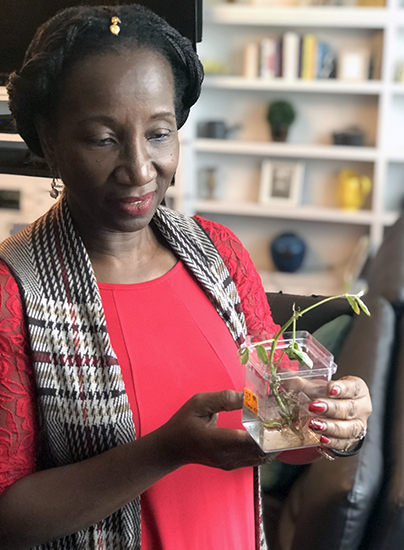
NC's IngateyGen Seeks Gene-Edited Solution for Peanut Allergy Conundrum

When Hortense Dodo sees a problem, she thinks solution.
So soon after she received her doctoral degree in molecular biology, Dodo decided she had a responsibility, as a scientist, to identify, and solve, a problem worthy of her training.
While working as an assistant professor at Alabama A&M University, Dodo learned that a colleague’s daughter had severe peanut allergies. The more Dodo learned about the precautions the family had to take to protect the girl from accidental peanut exposure or ingestion, the more fascinated she became with the life-threatening condition posed by this ubiquitous legume.

That’s why Dodo is now the co-founder and president of IngateyGen. It’s an ag biotech company in northeastern North Carolina’s Elizabeth City, a waterfront town known more for its fishing and oysters than its peanuts. The surrounding eastern North Carolina flatlands, however, are major peanut country.
According to the U.S. Food and Drug Administration, about a million American children are affected by peanut allergies. Symptoms can range from hives, swelling and digestive discomfort to constriction of the throat and airway and loss of blood flow to vital organs. Severe reactions can be fatal, even with appropriate and prompt treatment.
Allergic reactions can be triggered by direct contact, cross-contact (i.e., food exposed to peanuts during processing or handling) or even inhalation (i.e., breathing dust or aerosols containing peanut allergens).
When Dodo got involved, she saw doctors helping people with their peanut allergies from “the human side.” As a plant scientist, Dodo said she wanted to explore solutions from “the plant side.”
A process and a patent for reducing allergens in peanuts
Peanuts contain numerous allergens -- substances that cause allergic reactions. In fact, there are 16 proteins in peanuts that are recognized as allergens. Three of them – Ara h 1, Ara h 2 and Ara h 3 – are considered major threats. They trigger an immunological response in more than 50% of the allergic population.
Dodo aimed to use RNA interference (RNAi), a biotechnology process discovered in the 1990s, to suppress the expression of the three major allergens and two minor allergens, 6 and 7 in peanuts. Her research led to a 12-step, 14-month process, which she patented in 2000.
Realizing that she needed to offer her peanut allergy solution to the marketplace, Dodo left the academic world. She and Koffi Konan, Ph.D, co-founder and chief strategy officer of IngateyGen, established their ag biotech company in eastern North Carolina in 2014. The name “IngateyGen” is derived from the word for peanut in the language that Dodo spoke growing up in western Africa.
IngateyGen has conducted three years of field tests with its reduced-allergen peanut, Serenity, under the supervision of the United States Department of Agriculture. Shane Hand, chief executive officer of IngateyGen, says the company is projecting a 2022 market launch for Serenity peanuts.
New technology for eliminating allergens in peanuts
Since Dodo and her team conducted their early RNAi studies, a new biotechnology process has emerged on the gene-editing scene – CRISPR/Cas9. For Dodo and her interest in tackling peanuts’ allergens, this means there is a new possible solution to explore.
CRISPR/Cas9 is a gene-editing technology that can make a precise cut in an organism’s DNA. While RNAi can knock down gene expression, CRISPR/Cas9 can knock out gene expression.
“The CRISPR technology is much more powerful and precise than RNAi,” said Dodo. “In addition, when you are using CRISPR technology, you are not creating a genetically modified product and thus, you’re able to get the new product to market faster.”
Dodo and her team are now researching how to use CRISPR/Cas9 technology to finally remove all allergens from peanuts. The North Carolina Biotechnology Center granted IngateyGen a $100,000 Small Business Research Loan to support the study.
“The assistance we are getting from the North Carolina Biotech Center is helping us go beyond where we are today, to where we need to go tomorrow,” said Hand.
“Just last week, we had some very good results in the lab,” said Dodo. “We need to conduct additional analyses, but we’re excited to have proof that we’re moving in the right direction.”
There is no cure for peanut allergies today. Allergic reactions can be prevented only by strict peanut avoidance. At least that is the case until biotechnology removes all the allergens from peanuts – and that is the solution proposed by Dodo and her team.
